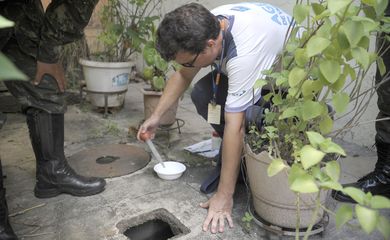Junior officers advise students to combat Aedes aegypti


Brasília – Health minister Marcelo Castro takes part in another stage of the countrywide campaign against the Aedes aegypti mosquito, along with students from Ciman School.)

João Vitor Pereira, 12, is a student from Colégio Ciman, a private school in Brasília. Thanks to a project carried out by the school, the boy also works as a junior officer. Their tasks include inspecting for the Aedes aegypti breeding sites in the educational institution, in addition to giving lectures to children on combating the Zika virus.
"I researched at home that we cannot have stagnant water and we need to clean well the containers filled with such water. That's what I teach to my colleagues," he explained. "Back home, I'll take the ways to prevent and I will share them with my parents, neighbors, colleagues. I will demand the cleaning."
Sciences teacher Michele Morato is one of the project's coordinator. According to her, the proposal turns students into multipliers in a vitally important campaign to combat Zika virus and other diseases transmitted by the Aedes aegypti.
"This work serves not only the school community, but also the school surroundings. This means that this information will be spread by these boys and they take it very seriously,” she explained. "Better than us adults, they are students from early childhood education knowing this and talking about the importance of all this for their own relatives."
Permanent actions
During a visit to the school, Health Minister Marcelo Castro defended today (Feb. 19) that actions to combat the Aedes aegypti throughout the country should be permanent. When taking part in the National Day of Mobilization against Zika in schools, he explained that the operation shall be monthly repeated in schools of all the country's capitals.
"We have several examples of towns that have eliminated the mosquito. They all had the government's participation, along with the civil society," he said, pointing out that more than two thirds of the vector's breeding sites are in private homes. "We need a permanent, systematic, and continuous action."
Translated by Amarílis Anchieta
Fonte: Junior officers advise students to combat Aedes aegypti



